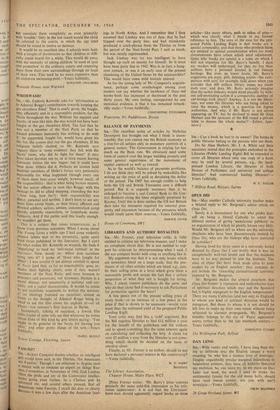LIBRARIES AND AUTHORS' ROYALTIES SIR,—Mr. Forster, your television critic, is
fully entitled to criticise my television manner, and I make no complaint about that. He is not entitled to sup- port his criticism by misrepresenting what I said. I did not compare books with soap or anything like it.
My argument was that it is not only books which are nowadays hired on a large scale; that the pro- ducers of all other articles which are hired, e.g., cars, fix their selling price at a level which gives them a reasonable profit and accept the fact that a certain proportion of what they sell is bought for hiring. Why, I asked, cannot publishers do the same and why do they alone find it necessary to ask Parliament for protection against the hirer?
A few pence out of the present selling price of every book—or an increase of a few pence in the price if that is shown to be necessary—would raise more than the estimated yield of the proposed Public Lending Right.
Your critic may find this a 'cold' argument. But the Bill requires libraries to find Elf million a year for the benefit of the publishers and the authors and to spend something like the same amount again on calculating and collecting the levy. A claim for over £2 million a year from the libraries is not some- thing which should be decided on the basis of emotion alone.
Finally, as Mr. Forster is an author, should he not have declared a personal interest in this controversy? —Yours faithfully,
The Library Association, Chaucer House, Ma/et Place, WC1
H. D. BARRY Secretary
[Peter Forster writes: 'Mr. Barry's letter conveys precisely the same cold-fish impression as his tele- vision appearance: it is sad that the Librarians' front-man should apparently regard books as mere
articles—like many others, such as cakes of soap— which was clearly what I meant in my former reference to him. The core of the case for the pro- posed Public Lending Right is that books are a special commodity, and that those who produce them are entitled to special consideration when (as now) circumstances have arisen which need adjustment. Quite why books are special is a topic on which I will not expatiate for Mr. Barry's benefit; I dare say readers will understand, for they no less than authors have a personal interest in our literary heritage. But even on lower levels, Mr. Barry's arguments are poor, glib, debating points—the com- parison with cars', for example, falls down when you consider that 400 million library issues are made each year, and does Mr. Barry seriously imagine that the motor industry would stand placidly by with- out self-protecting action if a comparable number of car-hirings took place? Anyway, it is not the librar- ians, not even the libraries who are being asked to raise the money, which is a question for higher authorities. And why, if Mr. Barry is not above appearing on TV, has he declined to meet Sir Alan Herbert and the sponsors of the Bill round a private table to discuss the whole matter?'—Editor, Spec- tator.]


































 Previous page
Previous page